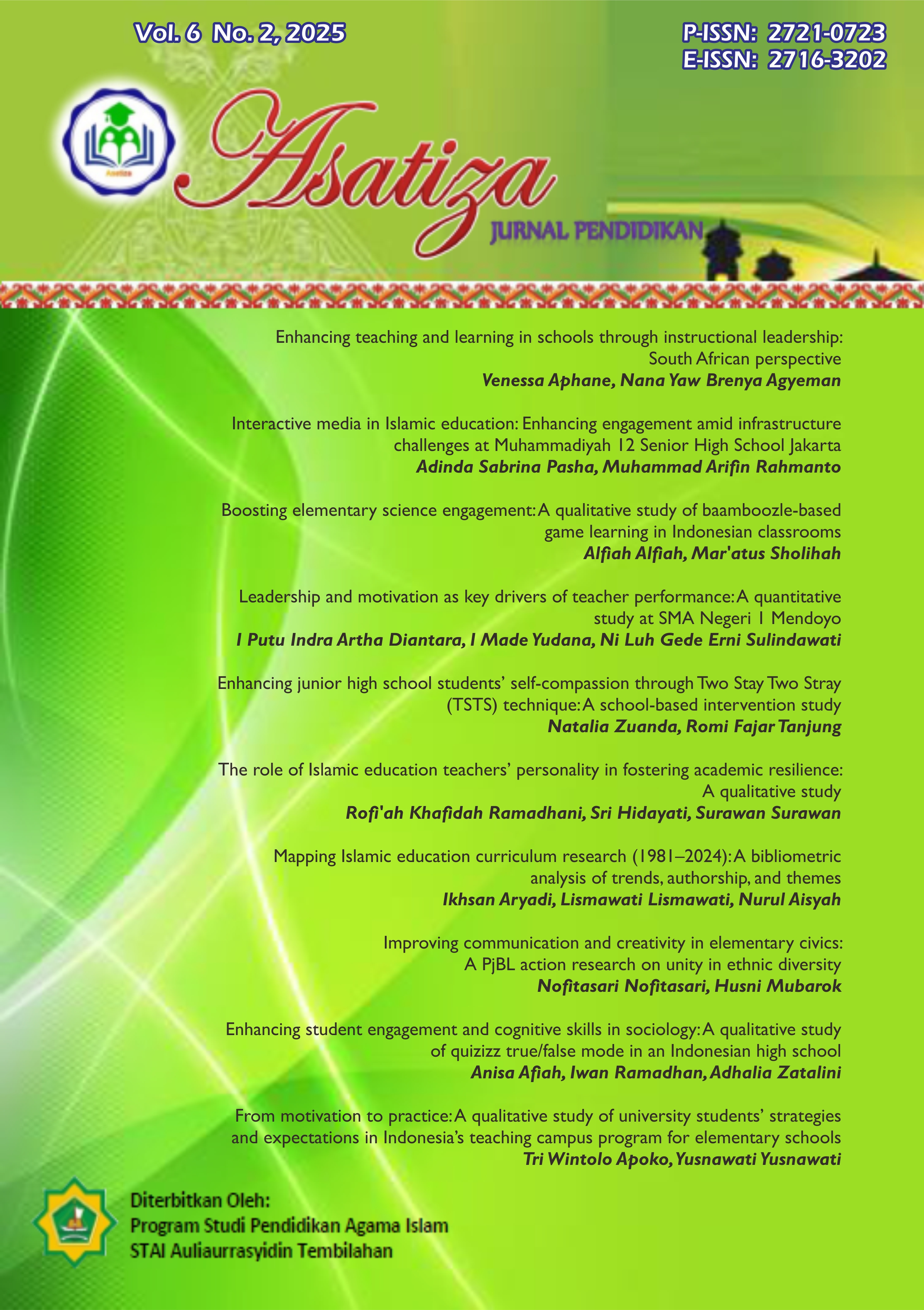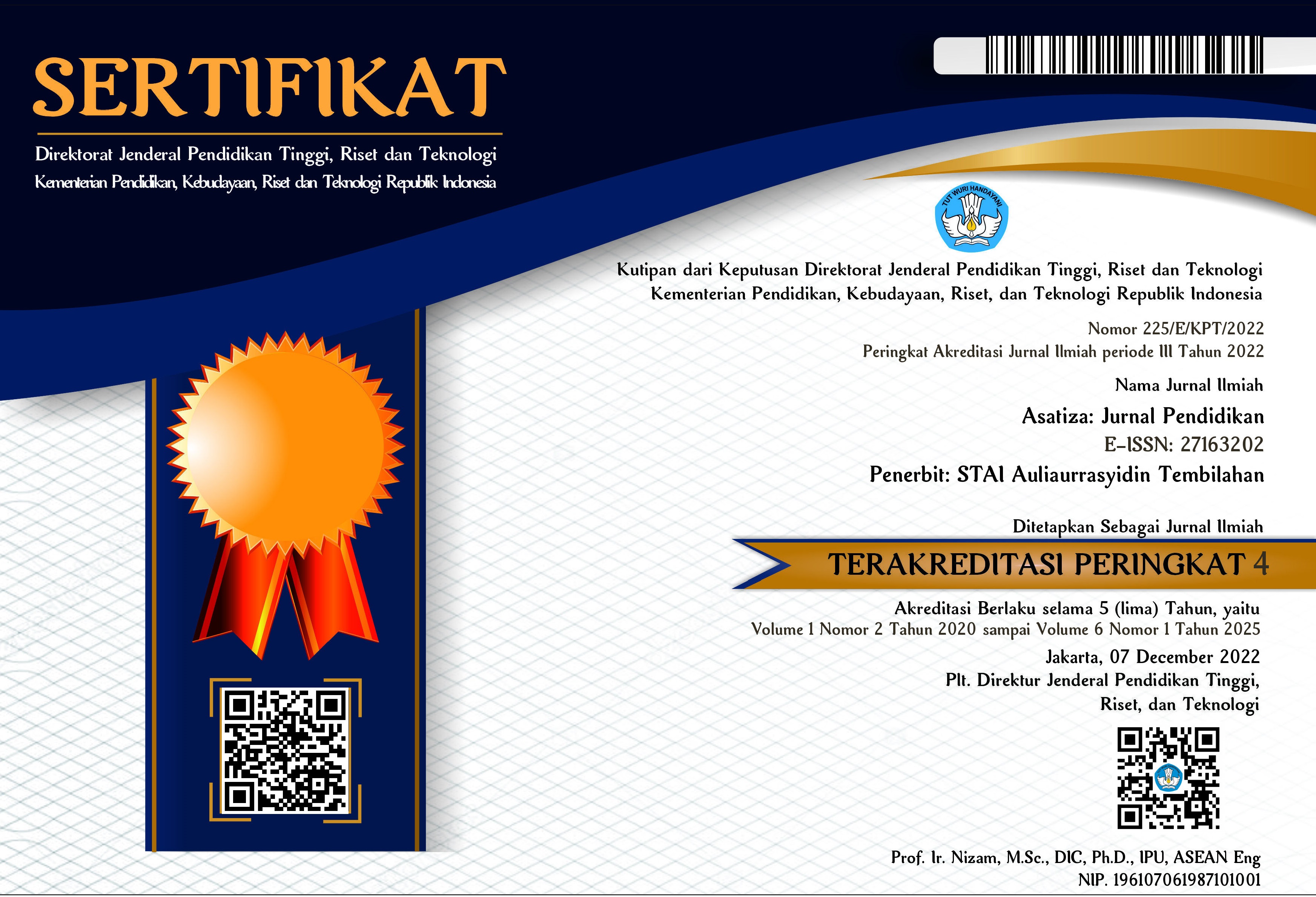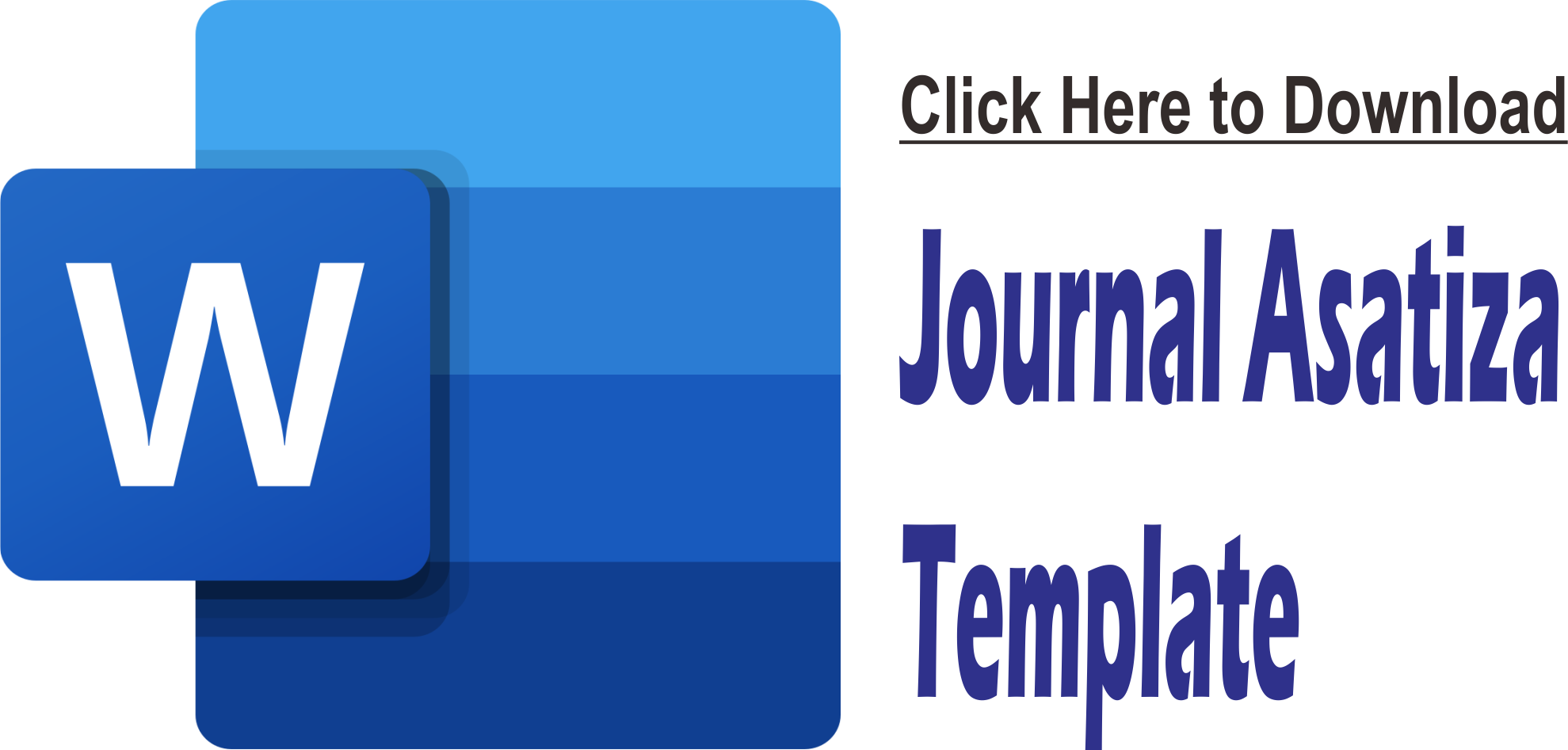Mapping Islamic education curriculum research (1981–2024): A bibliometric analysis of trends, authorship, and themes
DOI:
https://doi.org/10.46963/asatiza.v6i2.2780Keywords:
Bibliometric Analysis, Curriculum, Islamic EducationAbstract
This study examines the development and trends in Islamic education curriculum research from 1981 to 2024. Data were extracted from Scopus on November 7, 2024, using the query TITLE-ABS-KEY (Curriculum and Islamic and Education). After excluding non-English documents and non-article publications, 418 articles were analyzed bibliometrically. The analysis employed RStudio for statistical processing, VOSviewer for network visualization (co-authorship and keyword co-occurrence), and Microsoft Excel for supplementary data management. Findings indicate that Arvisais, O., Sanjakdar, F., and Zulfikar, T. were the most prolific authors (4 publications each). Ar-Raniry State Islamic University emerged as the leading institution (11 articles), while Indonesia contributed the highest output (162 articles). The Journal of Islamic Education published the most relevant studies (17 articles). This study provides a systematic overview of the field and suggests future research explore comparative curriculum models in Muslim-majority versus minority contexts.
Downloads
References
Apriantoro, M. S., & Susanto, I. W. (2024). Exploring the Landscape of Islamic management research through bibliometric analysis: Insights and Implications. Contemporary Management Research, 20(1), 47–73. https://doi.org/10.7903/cmr.23460
Ardilla, O., Syifa, S. M. N., Sitompul, A. L. (2024). Implementasi pendekatan sistematik untuk meningkatkan kualitas manajemen pendidikan. Socius: Jurnal Penelitian Ilmu-Ilmu Sosial, 2(4), 20–28. https://doi.org/10.5281/zenodo.14026352
Astuti, M., Ismail, F., Fatimah, S., Puspita, W., & Herlina. (2024). The relevance of the merdeka curriculum in improving the quality of Islamic education in Indonesia. International Journal of Learning, Teaching and Educational Research, 23(6), 56–72. https://doi.org/10.26803/ijlter.23.6.3
Ayusuhada, A., Sakinatunnafsi, S., & Mustika, D. (2024). Manajemen penyelenggaraan pendidikan inklusi pada lembaga pendidikan Islam. Gudang Jurnal Multidisiplin Ilmu, 2(6), 100–110. https://doi.org/10.59435/gjmi.v2i6.500
Bahri, S. (2017). Pengembangan kurikulum dasar dan tujuannya. Jurnal Ilmiah Islam Futura, 11(1), 15. https://doi.org/10.22373/jiif.v11i1.61
Brutu, D., Annur, S., & Ibrahim, I. (2023). Integrasi nilai filsafat pendidikan dalam kurikulum merdeka pada lembaga pendidikan Islam. Jambura Journal of Educational Management, 4(2), 442-453. https://doi.org/10.37411/jjem.v4i2.3075
Cikka, H. (2020). Konsep-konsep esensial dari teori dan model perencanaan dalam pengembangan pendidikan. Scolae: Journal of Pedagogy, 3(23), 103–114. http://dx.doi.org/10.56488/scolae.v3i2.81
Damopolii, M. (2015). Problematika Pendidikan Islam dan upaya-upaya pemecahannya. Tadbir, 3(1), 68–81. http://journal.iaingorontalo.ac.id/index.php/tjmpi
Daruati, D., Handoko, U., Yulianti, M., Ridwansyah, I., Rahmadya, A., & Verawati, D. (2022). Study on the Opportunities Related to Coastal Vulnerability in Indonesia Using Bibliometric Analysis. International Journal of Environmental Science and Development, 13(5), 184–188. https://doi.org/10.18178/ijesd.2022.13.5.1391
Daulay, M. R., & Pulungan, H. R. (2024). Efektivitas dan kualitas kepemimpinan dalam manajemen pendidikan Islam. Al-Murabbi Jurnal Pendidikan Islam, 2(1), 120–147. https://doi.org/10.62086/al-murabbi.v2i1.668
Fahira, N., & Ramadan, Z. H. (2021). Analisis penerapan 5 nilai karakter dalam pembelajaran di sekolah dasar. QALAMUNA: Jurnal Pendidikan, Sosial, Dan Agama, 13(2), 649–660. https://doi.org/10.37680/qalamuna.v13i2.1074
Faizin, F., Helandri, J., & Supriadi, S. (2024). Implementasi nilai-nilai pendidikan Islam dalam konteks modern: Tinjauan terhadap praktik dan tantangan. TA’LIM: Jurnal Studi Pendidikan Islam, 7(1), 93–116. https://doi.org/10.52166/talim.v7i1.5742
Fikri, M. A. (2024). Pendidikan Islam dan pembentukan identitas muslim Indonesia. Jurnal PAI, 3(1), 149–156. https://doi.org/10.56854/sasana.v3i1.382
Hadi, S., Sholihah, Q., & Warsiman, W. (2022). Pembelajaran inovatif pendidikan karakter pada mata kuliah bahasa Indonesia meningkatkan kualitas sikap, minat, dan hasil belajar siswa. Briliant: Jurnal Riset Dan Konseptual, 7(4), 905. https://doi.org/10.28926/briliant.v7i4.1148
Hasbiyallah, H., Munadi, M., & Nurulhaq, D. (2023). Character education model for high school students during the pandemic in terms of pedagogic competence and teacher personality. International Journal of Instruction, 16(2), 1077–1094. https://e-iji.net/ats/index.php/pub/article/view/220
Hidayatullah, N. M., Bani, B., Angelia, C. P., Nurhidayati, H., & Ningrum, A. R. (2024). Analisis bibliometrik : Penelitian technology acceptance model tahun 2014-2023 menggunakan bibliometrik dan vosviewer. Comdent: Communication Student Journal, 2(1), 138-158. https://doi.org/10.24198/comdent.v2i1.58290
İri, R., & Ünal, E. (2024). Bibliometric Analysis Bibliometric Analysis of Research (1980-2023). Ahi Evran Üniversitesi Sosyal Bilimler Enstitüsü Dergisi, 10(2), 386–403. https://doi.org/10.31592/aeusbed.1446738
Ismail, S. I., Saepulmillah, A., Ruswandi, U., & Samsul Arifin, B. (2020). Analisis kritik terhadap pelaksanaan pembelajaran PAI di sekolah. Jurnal Pendidikan Islam, 11(2), 170–188. https://doi.org/10.22236/jpi.v11i2.5901
Kurdi, M. S., & Kurdi, M. S. (2021). Analisis bibliometrik dalam penelitian bidang pendidikan: Teori dan implementasi. Journal on Education, 3(4), 518–537. https://doi.org/10.31004/joe.v3i4.2858
Maisaroh, A. A., & Untari, S. (2024). Transformasi pendidikan karakter melalui kebijakan pemerintah di Indonesia menuju generasi emas 2045. Jurnal Kebijakan Pemerintahan, 7(1), 18–30. https://doi.org/10.33701/jkp.v7i1.4347
Manan, A. (2023). Pendidikan Islam dan perkembangan teknologi : Menggagas harmoni dalam era digital. SCHOLASTICA: Jurnal Pendidikan Dan Kebudayaan, 5(1), 56-73. https://jurnal.stitnualhikmah.ac.id/index.php/scholastica/article/view/1865
Mubarrok, U. S., & Rahmawati, Z. (2020). Analisis bibliometrik perkembangan penelitian bank wakaf . Malia: Jurnal Ekonomi Islam, 12(1), 17–28. https://doi.org/10.35891/ml.v12i1.1938
Mukhibat, M., Effendi, M., Setyawan, W. H., & Sutoyo, M. (2024). Development and evaluation of religious moderation education curriculum at higher education in Indonesia. Cogent Education, 11(1). https://doi.org/10.1080/2331186X.2024.2302308
Muntashir. (2021). Distribusi fitur dan struktur intelektual publikasi ilmiah subjek ilmu perpustakaan dan informasi. Maktabatuna: Jurnal Kajian Kepustakawanan, 3(2), 172–194. https://doi.org/10.15548/mj.v3i2.3737
Nainggolan, E., Merung, A. Y., Harsono, I., Ayu, I., Suprapti, I. A. P., & Sutanto, H. (2024). Dinamika kolaborasi penulis dalam penelitian kewirausahaan berkelanjutan : Analisis bibliometrik. Jurnal Ekonomi dan Kewirausahaan West Science, 2(01), 46–58. https://doi.org/10.58812/jekws.v2i01.885
Nasir, M. (2021). Curriculum development and accreditation standards in the traditional Islamic schools in Indonesia. Journal of Curriculum Studies Research, 3(2), 37–56. https://doi.org/10.46303/jcsr.2020.3
Nobanee, H., Hamadi, F. Y. Al, Abdulaziz, F. A., Abukarsh, L. S., Alqahtani, A. F., Alsubaey, S. K., Alqahtani, S. M., & Almansoori, H. A. (2021). A bibliometric analysis of sustainability and risk management. Sustainability (Switzerland), 13(6), 1–16. https://doi.org/10.3390/su13063277
Pahrudin, A., Kuswanto, C. W., & Leni, N. (2021). The implementation of Madrasah Aliyah curriculum: Quality improvement management. Tadris: Jurnal Keguruan dan Ilmu Tarbiyah, 6(2), 311–324. https://doi.org/10.24042/tadris.v6i2.9719
Passas, I. (2024). Bibliometric analysis: The main steps. Encyclopedia, 4(2), 1014–1025. https://doi.org/10.3390/encyclopedia4020065
Putri, N. K. R., & Setiawan, C. (2022). What Islamic education teachers need to know and be able to do to teach students higher-order thinking skills? Afkaruna: Indonesian Interdisciplinary Journal of Islamic Studies, 18(2). https://doi.org/10.18196/afkaruna.v18i2.9462
Rohman, A., Meraj, G., Isna, A., Taruna, M. M., Rachmadhani, A., Atmanto, N. E., & Nasikhin. (2024). Challenges in Islamic education curriculum development: A comparative study of Indonesia, Pakistan, and India. International Journal of Learning, Teaching and Educational Research, 23(6), 504–523. https://doi.org/10.26803/ijlter.23.6.23
Safina, S., Hidayanti, N. F., Ariani, Z., Dewi, N. Y. S., & Agustina, A. (2024). Peran pendidikan ekonomi syariah dalam meningkatkan kesadaran finansial dan literasi syariah. Seminar Nasional Paedagoria, 4(1), 236–248. https://journal.ummat.ac.id/index.php/fkip/article/view/25628
Saputro, D. R. S., Prasetyo, H., Wibowo, A., Khairina, F., Sidiq, K., & Wibowo, G. N. A. (2023). Bibliometric analysis of neural basis expansion analysis for interpretable time series (N-Beats) for research trend mapping. BAREKENG: Jurnal Ilmu Matematika dan Terapan, 17(2), 1103–1112. https://doi.org/10.30598/barekengvol17iss2pp1103-1112
Siregar, N., Hanani, S., Sesmiarni, Z., Ritonga, P., & Pahutar, E. (2024). Dampak pelaksanaan kurikulum merdeka belajar terhadap pembelajaran pendidikan agama Islam. Dharmas Education Journal (DE_Journal), 5(2), 680–690. https://doi.org/10.56667/dejournal.v5i2.1345
Sonia, G. (2024). Meningkatkan keunggulan kompetitif melalui peran dosen asing di perguruan tinggi. Murid: Jurnal Pemikiran Mahasiswa Agama Islam, 2(2), 69–77. https://doi.org/10.51729/murid.22772
Talukder, S. C., Lakner, Z., & Temesi, Á. (2024). Development and state of the art of entrepreneurship education: A bibliometric review. Education Sciences, 14(3). https://doi.org/10.3390/educsci14030295
Wardhana, A. S. J., & Muafi, M. (2022). Systematic mapping of green human resource management: Bibliometric analysis. Bussecon Review of Social Sciences (2687-2285), 3(4), 01–10. https://doi.org/10.36096/brss.v3i4.270
Yu, F., Yin, L., & Wang, G. (2023). A Worldwide assessment of quantitative finance research through bibliometric analysis. Applied Economics and Finance, 10(2), 1. https://doi.org/10.11114/aef.v10i2.5949
Downloads
Published
Issue
Section
License
Copyright (c) 2025 Ikhsan Aryadi, Lismawati Lismawati, Nurul Aisyah

This work is licensed under a Creative Commons Attribution-ShareAlike 4.0 International License.
Authors who publish with this journal agree to the following terms:
1. Copyright on any article is retained by the author(s).
2. The author grants the journal, right of first publication with the work simultaneously licensed under a Creative Commons Attribution shareAlike 4.0 International License that allows others to share the work with an acknowledgment of the work’s authorship and initial publication in this journal.
3. Authors are able to enter into separate, additional contractual arrangements for the non-exclusive distribution of the journal’s published version of the work (e.g., post it to an institutional repository or publish it in a book), with an acknowledgment of its initial publication in this journal.
4. Authors are permitted and encouraged to post their work online (e.g., in institutional repositories or on their website) prior to and during the submission process, as it can lead to productive exchanges, as well as earlier and greater citation of published work.
5. The article and any associated published material is distributed under the Creative Commons Attribution-ShareAlike 4.0 International License











2.png)



